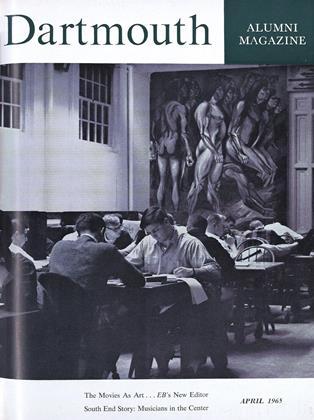THE American premiere of Bara toKaizoku ("The Rose and the Pi- rate") in the Hopkins Center on April 19 promises to be a night of Oriental splendor — and one for Dartmouth historians to record as a Four-Star Extra.
One of the Stars of this highlight evening in the term-long activities of the program on "Contemporary and Classical Japan" will be out in the audience. The Honorable Ryuji Takeuchi, Japan's Ambassador to the United States, will be the College's guest of honor. Other first-nighters will represent the arts, industry and commerce, diplomacy, communications, and education in both Japan and in the United States.
The second Star will be in Tokyo, unless playwright Yukio Mishima, author of "The Rose and the Pirate," should decide to be in Hanover when his drama receives its first American production in English. Mishima is the 39-year-old novelist-dramatist who has been credited by many with giving the traditional Japanese No drama a new meaning and scope through his scripts that successfully fuse the beauty and style of the older theater with the themes of modern life and the techniques available in modern theatrical production.
The third Star must get double billing, for Hachidai Nakamura, a jazz pianist known in this country as the composer of the "pop" hit "Suki-yaki," is not only taping the incidental music for the Mishima play but also will share a concert evening performance earlier in the month with koto player, Kimio Eto, and the dancer, Suzushi Hanayagi.
For the fourth of our Stars, stage director Takeo Matsuura, the April 19 opening will be the high point of a two-month residency in Hanover and his American theatrical debut. Directing a Japanese play in English and in the United States is a bit of a switch for the experienced 38-year-old Matsuura; among his numerous theater credits in Japan are productions of Edward Albee's "Who's Afraid of Virginia Wolff?", several plays by Tennessee Williams, and John Osborne's "Look Back in Anger."
Matsuura spent ten months in the United States in 1962 studying American drama and since that time he has translated a number of scripts for production and publication in Japan. Although he describes his spoken English as only fair, he rates himself "excellent" in reading. In his recent casting of the Mishima script — a play that he had earlier directed in Japanese — Matsuura initially communicated with the Dartmouth undergraduates and Hanover women trying out for parts through an interpreter, but now he's going it alone for the most part — with the occasional assistance of the students from Japan featured on the ALUMNI MAGAZINE cover last month.
How does he manage to direct his undergraduate English-speaking cast? Words are only a part of communicating to an actor, Matsuura says. Gestures, expressions, and attitudes all help an actor expres emotion, he goes on to note, and a director with an acting background can use the same methods to show how a scene should be played. And because it's a demonstration, an acting out, this is often a more effective means of directing, he thinks.
Director Matsuura does have the necessary background in acting. After earning his B.A. degree from Kaio University in 1951, Matsuura took up acting in stage, movies, and radio. In 1953, while con- tinuing on with his - acting, he began five years of private coaching under play-wright-director Junio Kishida. In addition to acting, directing, and translating, he has also lectured in drama at Tokyo's Waseda University and elsewhere in Japan, written radio and television scripts, and has been a newspaper drama critic.
But it's in his work as a director of both Western and traditional drama that Matsuura fits so perfectly into the "Contemporary and Classical Japan" program mounted jointly by the Hopkins Center and the Comparative Studies Center. Director Matsuura has done 27 modern plays, both Japanese and Western; five Kabuki-style dramas; and eight in the Shimpa, or School of Traditional Drama in Japan. While the highly stylized traditional theater, dating back to the 14th Century and featuring tableaux, masks, and heavy make-up, might be thought to be a dramatic world apart from the modern Western-oriented drama in vogue in Japan since the end of World War II, many Japanese directors and playwrights, like Matsuura and Mishima, work successfully in both styles.
The Valley NewsVisiting director Takeo Matsuura (r) perches on couch to show desired action tocast members (from left) Glen Kilpatrick '66, Alice Young, and Steve Bailey '66.
Gestures work better than words
 View Full Issue
View Full Issue
More From This Issue
-
 Feature
FeatureThe Movies As Art
April 1965 By DAVID STEWART HULL '60 -
 Feature
FeatureEB's EDITOR
April 1965 By CLIFFORD L. JORDAN '45 -
 Feature
FeatureAmbassadors Without Portfolio
April 1965 By PAUL C. PRINGLE '65 -
 Feature
FeatureSOUTH END STORY
April 1965 -
 Article
ArticleWITH THE BIG GREEN TEAMS
April 1965 By ERNIE ROBERTS -
 Article
ArticleLove-Letter to a College
April 1965 By A NEW ASSISTANT PROFESSOR







